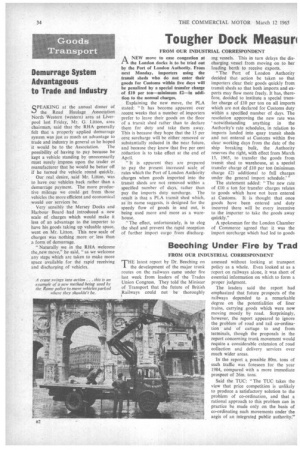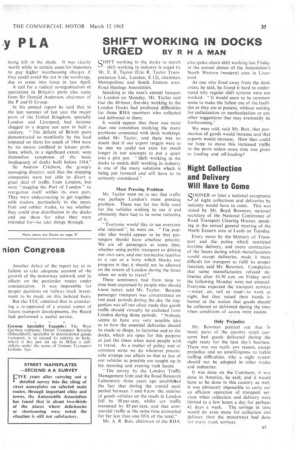Tougher Dock Measur PLA
Page 36

Page 37

If you've noticed an error in this article please click here to report it so we can fix it.
FROM OUR INDUSTRIAL CORRESPONDENT
ANEW move to ease congestion at the London docks is to be tried out by the Port of London Authority. From next Monday, importers using the transit sheds who do not enter their goods for Customs within five days will be penalized by a special transfer charge of Elt) per ton—minimum /2—in addidon to the normal charges.
Explaining the new move, the PLA stated: "It has become apparent over recent weeks that a number of importers prefer to leave their goods on the floor of a transit shed rather than to declare them for duty and take them away. This is because they hope that the 15 per cent surcharge will be either removed or substantially reduced in the near future, and because they know that five per cent reduction is to take effect at the end of April.
"It is apparent they are prepared to pay the present increased scale of rates which the Port of London Authority charges when goods imported into the transit sheds are not removed within a specified number of days, rather than pay the imports duty surcharge. The result is that a PLA transit shed which, as its name suggests, is designed for the speedy flow of goods in and out, is being used more and more as a warehouse.
"The effect, unfortunately, is to clog the shed and prevent the rapid reception of further import cargo from discharg ing vessels. This in turn delays the discharging vessel from moving on to her loading berth to receive exports.
"The Port of London Authority decided that action be taken so that importers clear their goods quickly from transit sheds so that both imports and exports may flow more freely. It has, therefore, decided to institute a special transfer charge of £10 per ton on all imports which are not declared for Customs duty within a specified number of days. The resolution approving the new rate was 'notwithstanding anything in the Authority's rate schedules, in relation to imports landed into quay transit sheds and not entered at Customs within five clear working days from the date of the ship breaking bulk, the Authority reserves the right, with effect from March 15, 1965, to transfer the goods from transit shed to warehouse, at a special transfer charge of £10 per ton (minimum charge £2) additional to full charges under the general import schedule.'"
The statement added: "The new rate of £10 a ton for transfer charges relates to goods which have not been entered at Customs. It is thought that once goods have been entered and duty incurred there will be every incentive to the importer to take the goods away quickly," A spokesman for the London Chamber of Commerce agreed that it was the import surcharge which had led to goods being left in the sheds. It was clearly worth while in certain cases for importers to pay higher warehousing charges if they could avoid the cut in the surcharge, due t6 come into force in late April.
A call for a radical re-organization of operations in Britain's ports also came from Sir Donald Anderson, chairman of the P and 0 Group.
In his annual report he said that in the late summer of last year the major ports of the United Kingdom, specially London and Liverpool, had become clogged to a degree not seen in half a century. "The defects of British ports demonstrated so manifestly by the load imposed on them for much of 1964 were by no means confined to labour problems, which, to a significant extent, were themselves symptoms of the basic inadequacy of docks built before 1914."
Sir Andrew Crichton, the group's managing director, said that the shipping companies were not able to divert a great deal of traffic from London, but were ". nagging the Port of London" to reorganize itself within its own port. They were endeavouring to get together with traders, particularly in the meat, fruit and rubber trades, to see whether they could stop distribution in the docks and use them for what they were intended for—to take things through.
























































































































